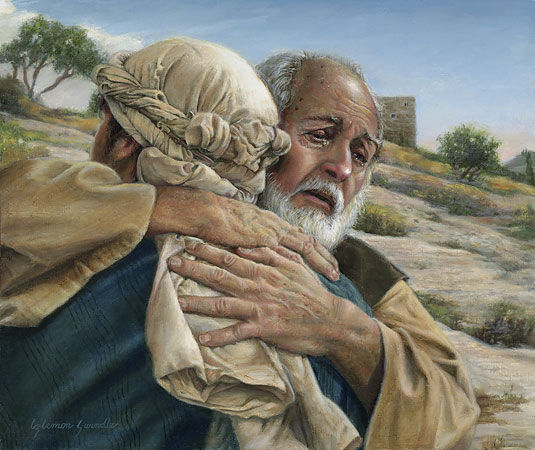I wonder how many times we have read, heard, and
listened to homilies on the story of the Prodigal Son. I would imagine that the number would be
quite high indeed. For us priests and
deacons who preach sometimes these well known stories are actually tougher to
preach than those Gospel readings that are more theological, obscure, or
difficult to understand. Anyway, I
wanted to do something a little different today in regards to the Prodigal Son
story. I want to reflect on, “we may be in
for a surprise in the next life.”
What do I mean by that? When I was a seminarian our vice-Rector
Brother Bill, actually a deacon, would often say, “We are going to be surprised
by who we realize made it to heaven and who did not.” That is exactly the message Jesus is trying
to get across to the Pharisees and Scribes.
In the story, the Prodigal Son is the one who
squanders his inheritance, the one who turns his back on God and the Law of
Moses, he represents all the little folk, the sinner. The Father represents God, and the other son
– the older one represents the Pharisees and Scribes, the ones who are
self-righteous.. If you notice when the
Prodigal Son returns the older brother demands to know the reasoning and the
justice behind the excellent treatment of a sinner compared to him who has always
followed the law and been an obedient son.
Jesus was a radical at times, and it is clear that he is being such
here.
There are two things that point to this, one) all
that matters is love and forgiveness and two) God’s ways are not our ways. The Prodigal Son returns to his father
because he loves him, he realizes the errors \ sins he has committed and is
truly sorry. But the older brother
doesn’t like this because he has followed the law meticulously and it’s just
not fair. How he is surprised! He can’t believe it, he’s in shock really.
Jesus uses this story to “shock” the Pharisees into
realizing that God judges differently than they do. God sees the human heart, He alone can judge
it. We see the human heart only
partially and our judgments are not perfect.
As Catholics and especially us priests we need to be careful in regards
to how we judge. I will often times hear
or read, that a person has to do such and such or this and that before they can
enter the kingdom of God and some hold to this is in a very strict and black
and white sense. Please do not
misunderstand me as Catholics we have obligations but those obligations must
spring from a desire of love and not just from duty, otherwise like the
Pharisees and Scribes we will become the judge of our brothers and sisters or
like the older son who believes he is entitled.
We are entitled to nothing. I will leave you with two things, the words
of my former Vice-rector Brother Bill, God rest his soul, “We are gonna be
surprised to see who made and who didn’t,” and finally the words of Christ
which teach us humility, “So should it be with you. When you have done all you have been commanded, say, ‘We are unprofitable servants; we have done what we were obliged to do.’” (Lk 17:10) If we are ever feeling like the older brother
remember Jesus’ call to humility. We are
owed nothing by God. If we do not humble
ourselves then we will stand before Him with prideful hearts and it is so much
better to stand before Jesus with a contrite and humbled heart. Amen.


No comments:
Post a Comment